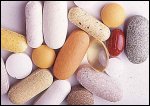
The other side of the argument
Just before the researchers at Oxford published their results in The Lancet, the equally prestigious Journal of the American Medical Association (JAMA) released a landmark recommendation that “All adults should take vitamin supplements, in addition to eating a balanced diet.”
Drs RH Fletcher and KM Fairfield, of Harvard University, who compiled the new JAMA Guidelines, stated, “Even people who eat five daily servings of fruit and vegetables may not get enough of certain vitamins for optimum health.” In addition, these researchers believe that, “most people cannot get the optimum levels of folate and vitamins D and E from currently recommended diets.”
When experts disagree
When experts disagree or seem to disagree, the public understandably gets confused.
Who are we supposed to believe? The Oxford report or the Harvard team? Must we take vitamin and mineral supplements, or is this just a ploy to get us to spend hard-earned money on unnecessary supplements? If we take such supplements will they make any difference to our health?
Answers
Who should we believe? Firstly, it is important to understand that the Oxford study was conducted with patients at high risk of coronary heart disease who were given supplements of vitamin E, vitamin C and beta-carotene over a 5-year period. The results showed that these supplements did not decrease risk in patients who already had heart disease.
The Harvard team on the other hand is suggesting that the general population should take vitamin supplements to prevent a variety of diseases before they occur.
Do supplements make a difference?
There is a great deal of scientific evidence to show that vitamins and minerals do prevent a variety of diseases, such as:
- Spina bifida and neural tube defects in babies can be reduced by as much as 70% if women take multivitamins containing folic acid before and during pregnancy
- Regular use of multivitamins and mineral supplements by the elderly can improve immune and neurological function, thus reducing infectious diseases and mental degeneration
- Calcium and vitamin D supplements can reduce the incidence of hip fracture in elderly men and women, which in the USA translates to approximately 50 000 fewer hip fractures a year and a potential saving of up to $2 billion annually
- There is a growing body of evidence that taking folic acid supplements for long periods can prevent certain types of cancer
- At the present moment, the South African government is investigating fortification of our staple foods (maize meal and wheat bread), with vitamins and minerals to prevent outright and subclinical deficiencies in disadvantaged population groups
How do supplements protect us?
Vitamins, bioflavonoids and minerals, such as beta-carotene, vitamins A, C and E, folic acid, vitamins B6 and B12, lycopene, zinc and selenium, are antioxidants, and immunity boosters.
Antioxidants for example, are used by the body to fight free radicals. These free radicals are molecules which our bodies produce during normal metabolism which can cause damage to the body if they are not controlled by antioxidants. High levels of free radicals buildup due to a variety of illnesses, overexposure to toxins in food, water and air, and when the human body ages.
Antioxidants are capable of neutralizing the harmful effects of free radicals that can cause cancer, heart disease, strokes, cataracts, immune deficiency, arthritis and the physical and mental deterioration associated with aging.
For those of you who do not eat a fully balanced diet, who live hectic lives and are exposed to stress, or illness or hereditary risk of certain diseases, taking a vitamin and mineral supplement is a good idea. Ask your dietitian, doctor or pharmacist, to help you select a good product that can improve your health and wellbeing. - (Dr I.V. van Heerden, DietDoc)




 Publications
Publications
 Partners
Partners










